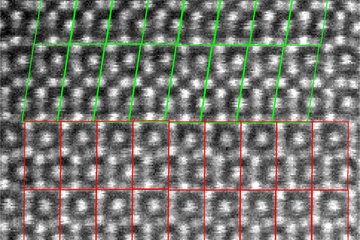All genres
361.
Talk
Magnetic systems studied by first-principles thermodynamics. CM Workshop, Akademie Biggesee, Attendorn, Germany (2011)
362.
Talk
Thermodynamics and kinetics of hydrogen interaction with point defects. CM-Workshop, Attendorn, Germany (2011)
363.
Talk
Ab initio up to the melting point: Anharmonicity in copper. CM-Workshop, Attendorn, Germany (2011)
364.
Talk
Ab initio determination of point defects and derived diffusion properties in metals. 3rd Sino-German Symposium, Xi’an, Shaanxi, China (2011)
365.
Talk
Computational Phase Studies: Deriving free energies and phase transitions from first principles. CECAM workshop 442: Materials Informatics: Tools for Design and Discovery, Lausanne, Switzerland (2011)
366.
Talk
Towards an ab initio based understanding of deformation mechanisms in high-manganese Steels. 1st Int. Conf. on High Manganese Steels, Seoul, South Korea (2011)
367.
Talk
Thermodynamics and Kinetics of Superabundant Vacancies in fcc Metals. MRS 2011 Spring Meeting, San Francisco, CA, USA (2011)
368.
Talk
Fully Ab Initio Description of Point Defect Formation and Properties at Extreme Temperatures. MRS 2011 Spring Meeting, San Francisco, CA, USA (2011)
369.
Talk
Hydrogen solution enthalpies derived from first principles: Chemical trends along the series of transition metals. DPG Frühjahrstagung 2011, Dresden, Germany (2011)
370.
Talk
Ab initio prediction of thermodynamic data for selected phases of the Al–Mg–Si–Cu system. DPG conference, Dresden, Germany (2011)
371.
Talk
Finite temperature magnetism combining first-principles and spin Quantum Monte Carlo. DPG Frühjahrstagung, 2011, Dresden, Germany (2011)
372.
Talk
Superabundant vacancies in fcc metals: A combination of ab-initio, thermodynamic and kinetics approaches. DPG 2011 Meeting, Dresden, Germany (2011)
373.
Talk
Enhancing mechanical properties of calcite by Mg substitutions - An ab initio study. American Physical Society - March Meeting, Dallas, TX, USA (2011)
374.
Talk
First principles concepts to calculate thermodynamic properties of magnetic materials. ICAMS Advanced Discussions, Bochum, Germany (2011)
375.
Talk
Chemical Trends for Phase Transitions in Magnetic Shape Memory Alloys Derived from First Principles. TMS2011, San Diego, CA, USA (2011)
376.
Talk
Ab Initio Determination of Point Defect Kinetics in Fe-Based Alloys. TMS 2011 Meeting, San Diego, CA, USA (2011)
377.
Talk
Strain-Induced Metal-Hydrogen Interactions across the First Transition Series – An Ab Initio Study of Hydrogen Embrittlement. TMS 2011 Meeting, San Diego, CA, USA (2011)
378.
Talk
First results of modeling and literature overview. HYDRAMICROS Workshop, Linz, Austria (2011)
379.
Talk
Enhancing mechanical properties of calcite by Mg substitutions: A quantum-mechanical study. DPG Frühjahrstagung, Dresden, Germany (2011)
380.
Talk
Ab initio study of thermodynamic, structural, and elastic properties of Mg-substituted crystalline calcite. TMS 2011, San Diego, CA, USA (2011)











